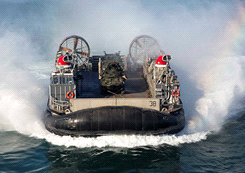LCE’s SEA Coaches Cost-Effectively Keep ACU-4’s LCAC Mission Ready
solutions
sectors


SEA Coaches Cost Effectively Keep ACU4 LCAC Mission Ready
In 1987, Assault Craft Unit Four (ACU-4) changed homeports from Panama City, Florida to Naval Amphibious Base Little Creek, Norfolk, Virginia. Designed to operate from every well deck-configured amphibious ship, the LCAC’s main mission is to deliver a 60-ton payload to a designated beachhead at speeds exceeding 35 knots. Combining high speed, exceptional maneuverability, and long-range qualities with the ability to travel over land, the LCAC provides added versatility to the U.S. Navy’s amphibious forces. ACU-4’s LCAC have been deployed throughout the world and taken part in all major amphibious operations.
Life Cycle Engineering (LCE) is tasked by NSWC Code 425 with providing On-Site Representation (OSR) to ACU-4. LCE currently has two Shipboard Equipment Assessment (SEA) Coaches assigned to this command.
Removing an Engine Is Not a Simple Task
The engine shop personnel were tasked with removing the #3 MPGT to allow access to that particular part of the engine room for welding repairs. Because the personnel were not properly trained in handling MPGT engines, during removal the fourth nozzle (the main supporting feature of the Power Turbine Assembly within the ETF40B) was damaged and required depot-level repair or replacement.
SEA Coaches to the Rescue
LCE’s SEA Coaches delivered both a short-term fix and a longer-term solution, avoiding a significant expense for the U.S. Navy.
The damaged engine was delivered to the engine shop for evaluation and repair. LCE SEA Coaches disassembled the engine and removed the power turbine assembly for further teardown and to replace the damaged nozzle. As part of that effort, the turbine rear bearing assembly had to be completely overhauled and built into the replacement nozzle assembly. During reassembly of the power turbine assembly and the mating process of the combustor turbine assembly to the front end of the engine, the SEA Coaches ensured the tightest possible gaps to ensure proper engine performance. New seal rings and springs were installed as well as replacement fuel manifolds to ensure the best possible engine performance. During this repair the SEA Coaches also replaced the first nozzle seal strip.
SEA Coach Experience Pays Off for the U.S. Navy
The cost estimate for the depot completing this repair was more than $500,000, including $66,000 to replace the damaged nozzle. Thanks to the expertise of the SEA Coaches, ACU-4 was able to use a Ready for Issue nozzle and complete the repair for $7,400, saving their limited budget for repairs truly beyond ACU capabilities. In addition to completing the immediate repairs, LCE’s SEA Coaches also developed and documented classroom training on the proper procedures for removing and installing main engines onboard LCACs.
Additional Information
For more information about improving operational and financial performance, please email us at SEACoach@LCE.com or visit www.LCE.com.
About Life Cycle Engineering
Life Cycle Engineering (LCE) provides consulting, engineering, information technology and education solutions that deliver lasting results for private industry, the Department of Defense and other government organizations. The quality, expertise and dedication of our employees enable Life Cycle Engineering to serve as a trusted resource that helps people and organizations to achieve their full potential. Founded in 1976, LCE is headquartered in Charleston, South Carolina with offices across North America and experience around the globe. Follow us on LinkedIn, Twitter and YouTube for company updates.

